#yakuts
Text
September 25th, 2022
The cries for help of Russia's national minorities: "We will stop existing"
"In small villages, with two or three streets, they have taken all the men" • Putin's draft mobilization punishes regions like Yakutia, Buryatia and Dagestan.
On the day after declaring partial mobilization in Russia, a member of the Duma [Russian Parliament] and ex-mayor of Jakutsk, in Siberia, protested that the number of reserves that each region has to send to the front [of the war in Ukraine] didn't match. She asked why regions like Novosibirsk only mobilize 0.27% of the men between ages 20 and 59 and, at the same time, Yakutia has to mobilize 1.66%. In addition, she added, why are precisely the most disadvantaged towns of the north of Yakutia where the proportion of men called to war is higher? "In villages of the Artic, with 300 inhabitants, they take 47 men. I know what it means to live in the north at -55°C [-67°F] and, without the men, families will have a very hard time. What is the logic behind these numbers? What kind of proportionality are we talking about?"
Yakutia, located north of the permafrost and almost 8,500 km away from Moscow, is a land rich in natural resources (diamonds, uranium, hydrocarbon...) and the immigration of workers for the extraction businesses has left Yakuts and Evens, the indigenous peoples, as a minority in the cities of the centre and south of the Republic. On the other hand, they are the majority in the towns of the north, from which they are now being sent en masse to the frontline.
We have talked to Aanis, a girl from a town of 500 inhabitants where 35 men have been called to war: "They've taken almost all young men from the town, of local ethnicities (Evens and Yakuts). It was very unexpected, nobody could have seen something like this coming. Before the mobilization, people from the town were not interested in the war, it's hard enough to survive. We were worried about everyday problems: hunting, how the vegetables were growing... Now everything has changed, we are shocked."
Nikolai, a man from a village in the north of Yakutia, answers resolutely when we ask what has happened: "We had never seen before what is happening now, not even in the Second World War. They have sent all the native men to the front." I ask him for more details: "My village is inhabited only by Yakuts and Evens. We're less than 500 people, out of which only 154 are of working age, including women. They have called to the front 65 people, almost all the men between ages 18 and 60." He adds that families don't know how they will survive this winter. "It reaches -60°C [-76°F], and we don't have centralised heating or water pipes. We use ovens to warm up and it's usually men who take care of that. We live from hunting. Who will hunt now? What will we eat? Nobody knows."
I ask him why does he think the authorities have decided to take them and not others: "Because we live in remote and very small villages, with no Internet; there are no lawyers here or organizations that defend us. Many of us don't speak Russian or English. They probably calculated that mobilizing us would have little repercussion: very few people would notice the absence of some minorities, even if they disappear completely. In fact, there's already few of us left.
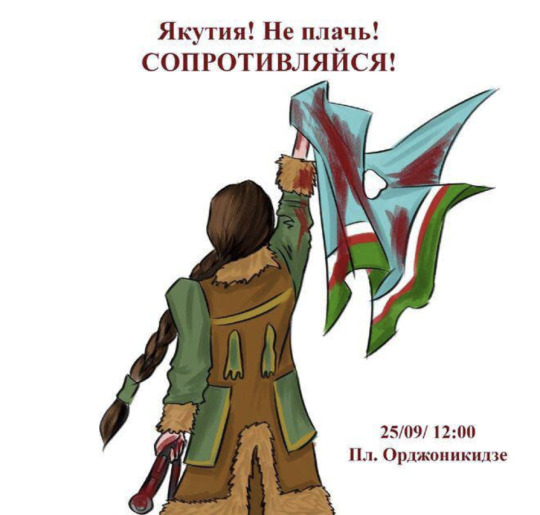
Poster calling for a protest of the Free Yakutia Foundation: "Yakutia! Don't cry! RESIST!"
In Yakutia, women have taken the streets to protest. They stand their ground. And they have done so, shouting "no to genocide!"
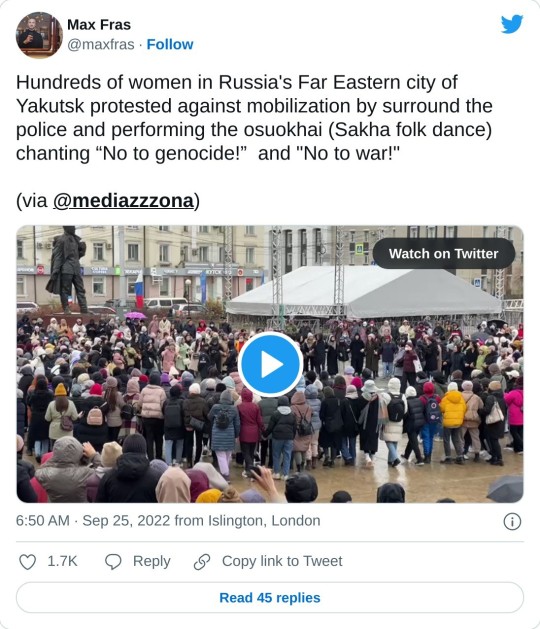
General mobilization in Buryatia
In Buryatia, a republic in the south of Siberia, bordering Mongolia, with a 35% native population of Mongolian origin (Buryats), their situation is just as harsh. "The mobilization in Buryatia is general, not partial", declares Aleksandra Garmazhapova, founder of a local NGO. Viktoriya Maladaeva, coordinator of the Free Buryatia Foundation, confirms it: "They're not calling up only reserves: they mobilize students, disabled people, and people who have never had any relation with the army. In small villages, with only two or three streets, they have taken all the men. There are families where they've called up the fathers and sons." She explains that many men were taken to the recruitment points during the night: "Then people started calling each other, and those who could drove their car to Mongolia. Others have hidden in the forests, in the taiga."
To answer to this situation, the ex-president of Mongolia (2009-2017) Tsakhiagiin Elbegdorj published the following message: "I know that since the beginning of this bloody war, the ethnic minorities that live in Russia are the ones that have suffered the most: the Mongols of Buryatia, of Tuva and Kalmykia have suffered. They have been used as cannon fodder. We, the Mongols, will welcome you with open arms and hearts. Our borders will stay open."
To the question of why she thinks Buryatia is disproportionately affected by the mobilization, Maladaeva answers without a doubt: "Because we are an ethnic minority and for Putin we are worthless [...] And that's the same in other "ethnic republics": right now we're getting calls from activists from Kalmykia, Chuvashia, Yakutia, Tuva... On the contrary, in the Irkutsk region (where there is a Slavic majority without notable minorities), there's silence, even though it borders us. Why?"
Dead in combat
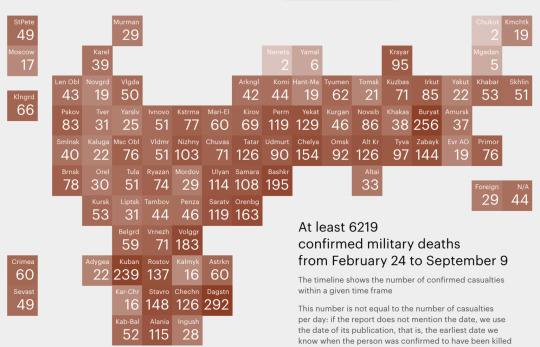
"Russian victims in Ukraine". Data compiled by Mediazona.
We must highlight that, until Putin signed the decree to mobilize reserves last Wednesday, going to fight in Ukraine was voluntary and paid. Those interested signed a contract with the Russian army and got paid a monthly salary between 130,000 and 200,000 rubles, depending on the region.
These salaries might not be much in Moscow, but they are a fortune in the most deprived areas. In the Russian capital city, the average monthly wage is about 115,009 rubles, three times the average monthly wage in Buryatia. If we look at unemployment rates, we see how it's 1.5% in Saint Petersburg while in Northern Caucasus republics, such as Ingushetia, it's as high as 30%. In the context of these economic inequalities, a result of highly centralized policies that center the economic wealth around the cities where political power resides and regulate the periphery to misery, it's no surprise that Buryats and Caucasians see an opportunity in an army wage, and knowing that in the worst of cases, if they die in combat, their families will receive (in theory) a compensation of 7 million rubles and a pension.
These economic reasons explain, in part, why the two regions with the most soldiers who died in combat in Ukraine are Buryatia and Dagestan (in the northern Caucasus). According to official data compiled by the Russian news portal Mediazona, 6,219 Russian soldiers have died in total in the war in Ukraine. From Buryatia, 256 have died (out of a total of 1 million inhabitants), and from Dagestan, 292 (out of 2.5 million inhabitants). These numbers contrast highly with the 17 dead soldiers from Moscow (12 million inhabitants) or the 49 deaths from Saint Petersburg (5 million inhabitants).
"We are the empire's trash"
Another factor that deepens the marginalization of minorities in Russia, that could have contributed to their disproportionate enlistment, is the prevailing racism in Russian society. Maria Viushkova, analyst of the Free Buryatia Foundation, declared in an interview: "The best alternatives in Buryatia for finding a job are either emigrating to South Korea or joining the army. For us, it's difficult to find work in other regions of Russia, where Buryats have to face discrimination and racism: they don't hire them, they don't house them, they limit their education. Often, Buryats who have tried their luck in other regions of Russia are forced to come back."
Aslan is a man from Kabardino-Balkaria, near Dagestan. He confirms that racism towards Caucasians is noticeable in Moscow, where he worked in some years: "It's constant. At work, first they looked badly at me, it took them a while to trust me. And when they knew me well, sometimes they spoke badly of Caucasians using a slur that they use to define us, "chernojopie" (black butts), not even realising I was there. In the subway, I have had problems with nationalists because of my looks. And my child has had quarrels with his friends for not being "Russian".
I ask him why he thinks it's them and Siberian minorities who are the most affected by this war. He's resolute: "Because we are the empire's trash to the Kremlin, and this is a way to get rid of us." And he adds: "But I don't understand why the Northern peoples don't rebel against Moscow, the empire has also wanted to destroy them. I think mobilization hasn't been as numerous in our republics in the Caucasus as it has in the Far East because they don't dare to, they know we'll stand up to them."
Aslan is probably right. The Caucasus is a potentially explosive region, where there was for years a Jihadist armed group made of young radicalized people with no hopes for the future. Authorities are not interested in feeding discontent and rage among these young people.
But in the Far East and in Siberia the situation is different, and the natives make a request of us. When I asked Nikolai, from the village in Yakutia that has been left with no young men, how could we help them, he said: "Please, report about the minority nations. If all men go to war, the genetic reserve of our people will be gone. In 20 years, or 40 years, our language will also go extinct. We will stop existing."
#war in ukraine#ukraine invasion#national minorities#ethnic minorities#russia#racism#yakutia#buryatia#dagestan#siberia#indigenous#evens#yakuts#tuva#kalmykia#kabardino-balkaria#caucasus#stateless nations#💬#genocide
237 notes
·
View notes
Photo

Companions of Christmas 17: Khaarchana
Khaarchana is the granddaughter of both Chyskhaan on her mother’s side and Ekhe Dyll on her father’lls. From birth, she learned to bounce back and forth between their very different holiday celebrations and expectations. Chyskhaan’s reverent and solemn traditionalism and Ekhe’s edacious, riotous merrymaking are often at stark contrast, as are the grandfathers themselves: Chyskhaan has, on more than one occasion, called Ekhe a classless, gluttonous yokel, and Ekhe has let Chyskhaan know that the former considers the latter a stuffy, bumptious snob.
When the winter giftgivers were, for a generation, expelled from Russia following its revolution, Khaarchana realized that children across Siberia would suffer greatly from the absence of her grandfathers. Despite the danger posed by Stalin’s minions and the difficulty in reconciling the two seemingly different approaches to the holidays, Khaarchana decided to fill their shoes, making sure that no child in (what is now) the Sakha republic would go without during winter festivities, and that the festivities themselves would be as rich and wonderful as they had ever been.
Going in with no experience, she consulted the longtime friend and colleague of both grandfathers, Santa Claus, whose advice was to be true to herself. The celebrations of the winter holidays are always changing and growing, and reverence and merrymaking needn’t be mutually exclusive. Knowing the peril that her mission would put her in, Santa gave Khaarchana a magical snowflake, which, when worn on her head, would render her invisible, allowing her to plan and maneuver under the eyes of the Russian secret police, only removing it and allowing herself to be seen on the New Year when she would hand out the presents she had strategically hidden in homes across Siberia.
When her grandfathers were eventually permitted to return to the Russian-controlled region, they found that Khaarchana had kept the spirit of love and giving alive during their absence, and had unified their two approaches into one one messy, inconsistent, glorious celebration. Though both were resistant to change, and to each other, Chyskhaan and Ehke began to accompany Khaarchana on her rounds, and, though they still bicker like old hens, they have become close friends, while Khaarchana, in addition to her role as giftgiver, is the patron of all who have to navigate the sometimes-conflicting holiday celebrations (and schedules) of more than one family.
81 notes
·
View notes
Photo
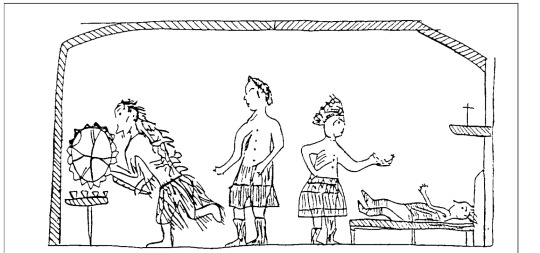


Shamans depicted on Yakut birch-bark tobacco containers (after Ivanov 1954).
“Rock art and the material culture of Siberian and Central Asian shamanism” by Ekaterina Devlet
#shamanism#shaman#anthropology#artefact#central asia#ritual#siberia#yakuts#sakha people#sakha republic#ekaterina devlet#my upl
55 notes
·
View notes
Text
Yhyaq Almaty 2023☀️
22 notes
·
View notes
Text
Ayhal Ammosov: "Yakutian Punk Against War"
Ayhal Ammosov: “Yakutian Punk Against War”
Ayhal Ammosov standing in front of a funeral bureau holding a placard that reads, “The groom has arrived.” Photo courtesy of Mediazona via Aikhal Ammosov
The Free Yakutia Foundation has published a letter from Ayhal Ammosov, an anti-war activist who disappeared last week. The letter is dated November 22.
Ammosov, who faces criminal charges stemming from his public activism, has not been in touch…
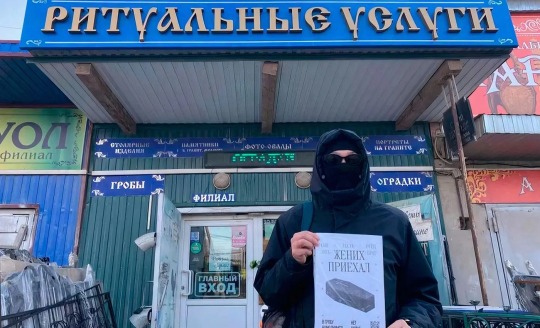
View On WordPress
#Ayhal Ammosov#Crispy Newspaper (band)#discrediting the Russian Armed Forces#Russian anti-war movement#Russian punk rock#Sakha people#Yakutia#Yakuts#Youth of the North (record label)
7 notes
·
View notes
Text
http://www.canilsemprejuntos.com.br
0 notes
Photo
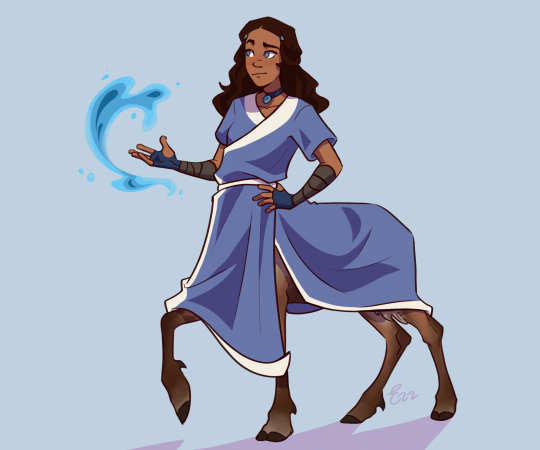
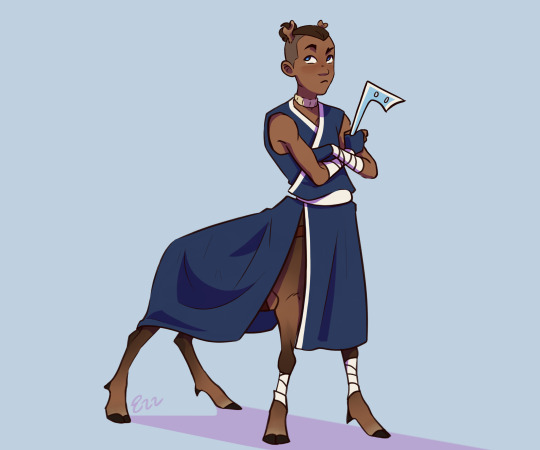
Dynamic duo (she’s about to throw that water at him)
Part 1
Part 3
Part 4
#avatar the last airbender#atla#sokka and katara#sokka#katara#atla fanart#centaur au#fun fact: originally they were gonna be yakut horses#but then i had an epiphany#and now they're caribou#sokka's very proud of his tiny baby antlers#nobody tell him that next spring Katara's gonna start growing hers and they're gonna be bigger
1K notes
·
View notes
Text
Law in Yakut national clothes. I really wanted to draw him in the costume of my people. I think according to the theme of his character our culture suits him pretty well.
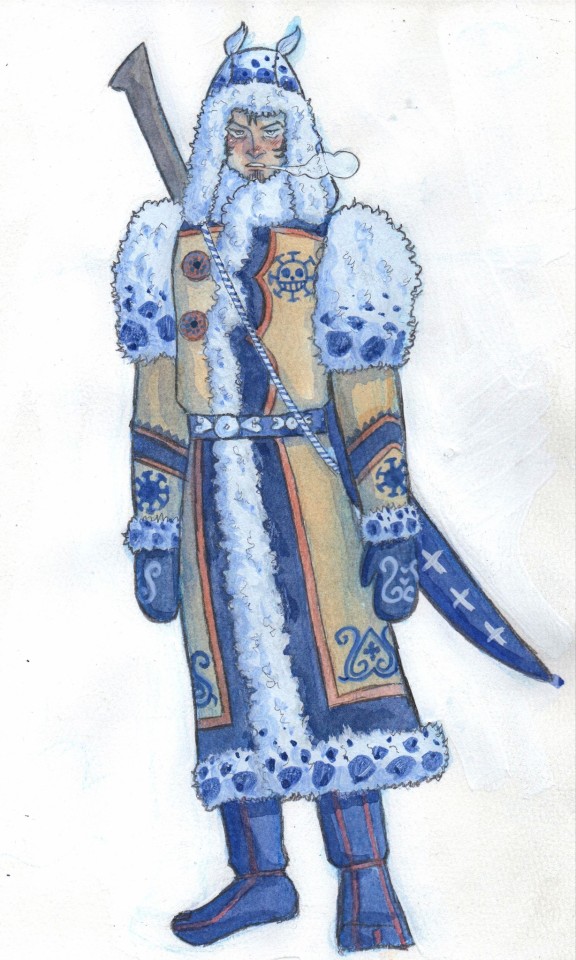
I wanted to add more heart-shaped patterns but that would be too much ig💀
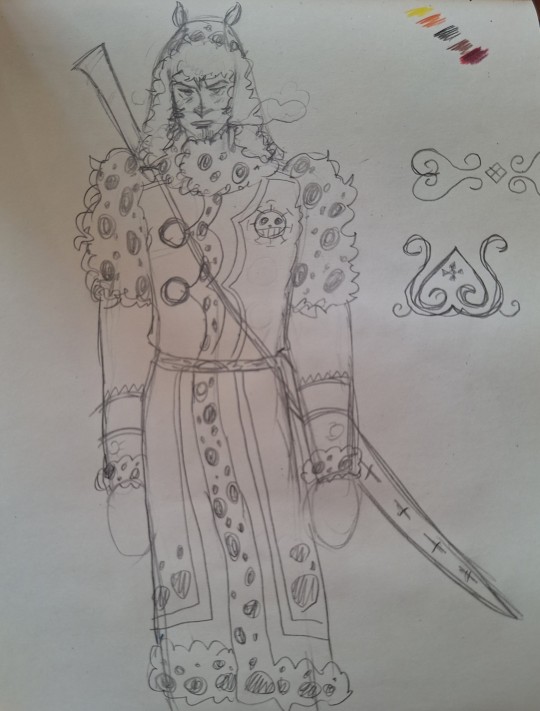
Also i made sketches of Luffy, Zoro, Sanji and Jimbei. Luffy and Sanji's costumes are more modernized, while Zoro and Jimbei's costumes are more archaic. I like Zoro's costume with parts of the archaic Yakut armor that were worn by booturs.
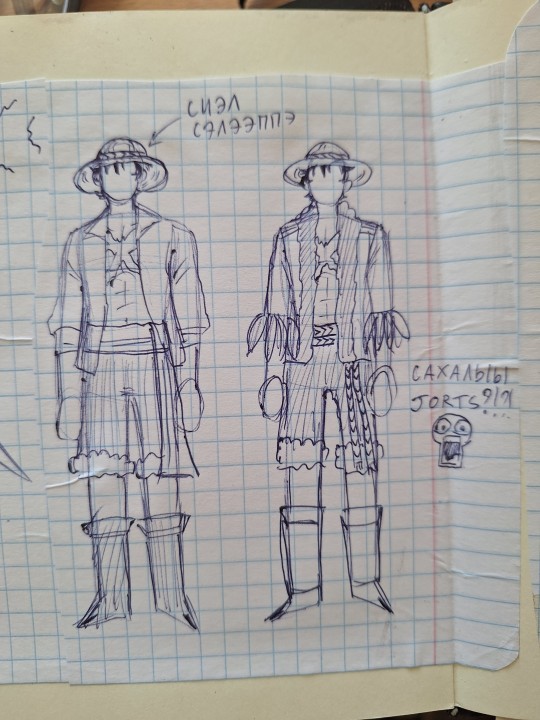
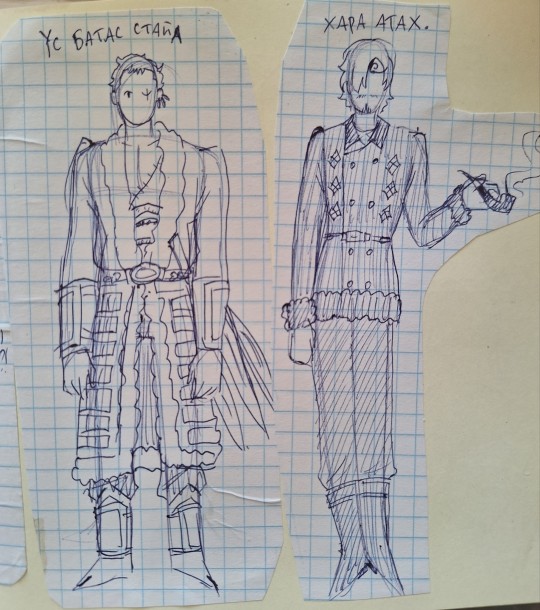
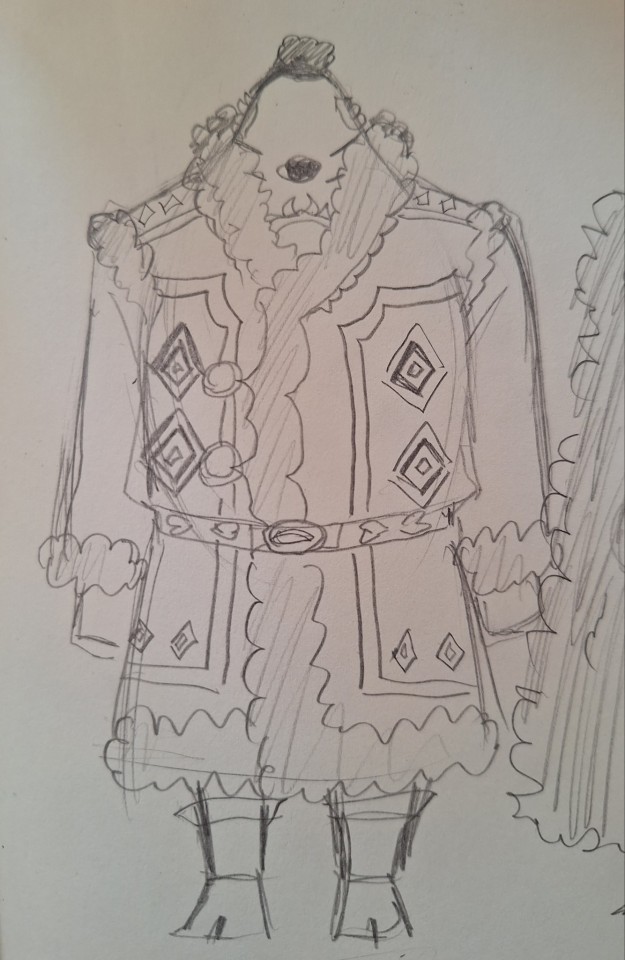
It was pretty fun, maybe I'll draw more
86 notes
·
View notes
Text
im thinking of changing my name again because im cursing at my 14 year old self who picked this random white name for me to live with now so ive been researching traditional Sakha names to get it right and apparently before the russians came and fucked up all our shit with their taxes and christianity, it was the norm for every Sakha person to change their name in their lifetime if not twice, then three times, and who knows if maybe more
basically, the newborn Sakha in the pre-christianity era would be given a name right away after birth like all kids, but once they grew up and started exhibiting individual traits they would be given a descriptive nickname which could describe pretty much anything about a person - positive characteristics, negative characteristics, physical quirks, facial features, body type, age, etc etc. one of my faves i found was Бэлтэкэ (Belteke) with means ‘round face’. would fit me ngl
anyways this is awesome news for me and i just wanted to share because learning that changing names throughout your life is historically super normal for our people makes me feel better about changing it for the second time, yknow? especially with the fact that those names were an individual’s descriptor. almost kind of like being trans and changing your name to one that suits you as a person better so you don’t walk around with the one that had nothing to do with who you really are on a personal level for your whole life
#also#apparently we had the practice of naming our kids ugly names to wart off demons too#i wonder if there’s ever been a Sakha kid named after the word hiccup#mostly from what ive read it was names based on nature like scary animals or gross insec#so they’d be walking around named Wolf and Polar Bear and stuff#sick as hell no?????#gene talks#sakha#yakut
346 notes
·
View notes
Text
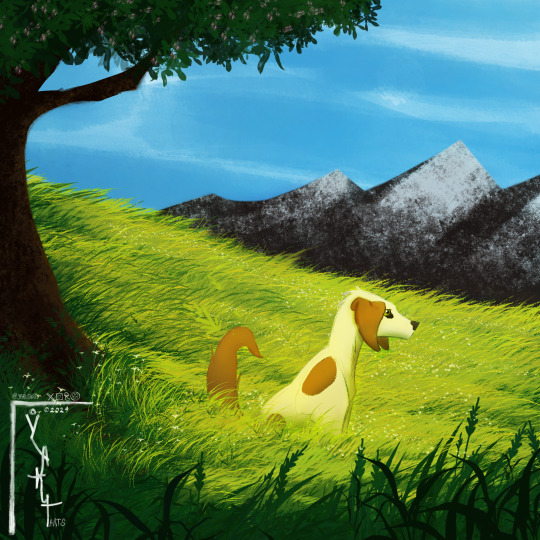
Brush testing on Procreate
First full artwork in the app
#artists on tumblr#art#artwork#drawing#digital art#digital artwork#furryart#furry#sfw furry#furry art#Yakut#Yakut art#Yakut Arts#dog#landscape#painting#landscape painting#procreate#procreate art#procreate app#testing#experimental art#new brush test#brush testing#new brushes#first full artwork on procreate#doggo#feral furry#feral#commissions are open
29 notes
·
View notes
Text
youtube
Beautiful animated film The Bull of Cold in Sakha (Yakut) language (English subtitles included).
42 notes
·
View notes
Text
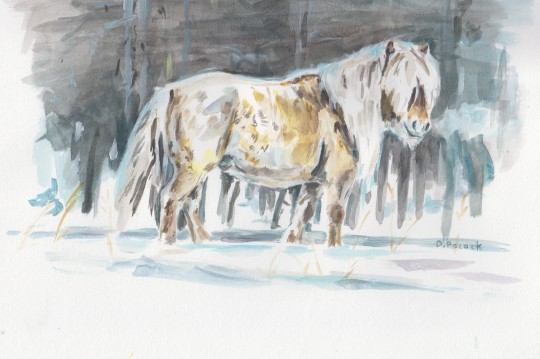
Study of a Yakutian horse in the snow
Acrylic paint on paper
#art#artist#artists on tumblr#animal art#horse#horses#equineart#horseart#acyrlicpainting#acrylicpainting#acrylic painting#acrylic#yakutian horse#yakut horses#yakut horse#horse breeds
152 notes
·
View notes
Text
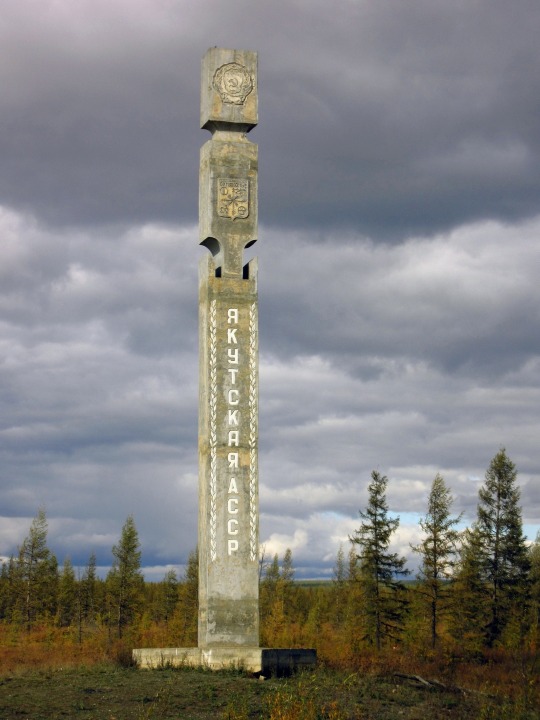
Stella at the entrance to the Yakut ASSR from the Magadan region. Made in the form of a ritual hitching post - serge. Serge means that the area where it is installed has an owner. According to tradition, it is done at the yurt, at the gate of the house (“as long as serge stands, the family is alive”), in places where shamanic rituals and burials are held. Hosts and guests tied their horses to it, and it is also a symbol of the tree of life - a certain pagan concept that has survived to this day. You cannot destroy serge - it must itself become unusable.
28 notes
·
View notes
Text
Güzel şeyler olsun istiyorum, Çok güzel şeyler… Sabah kalkınca mesela Penceremize kuş konmuş olsun, Kuşun gözünde güneş parıldasın, Sesinde çocuklar cıvıldasın…
Güzel şeyler olsun istiyorum… Çok güzel şeyler... Mesela İnce ince yağsın yağmur, Toprak suyla belensin, Tarlalarda buğdaylar boy versin, Aşka ve umuda bereket gelsin…
Güzel şeyler olsun istiyorum, Çok güzel şeyler… İnsan biraz da dertsiz kemale ersin, Ötekinin berikinin de yüzü gülsün…
Cümle mahlûkatın yüreğine, Aşkın ateşi düşsün…
Güzel şeyler olsun istiyorum artık, Çok güzel şeyler İnsanız sonuçta…
#Güzel şeyler olsun istiyorum… Çok güzel şeyler… İnsanız sonuçta.#didem madak#yüzüm güvercinlere emanet#gecenin vitrinine konulmuş büyük bir yakut parçasıydı sabah mahalle kahvelerinde sıcak çaydan adamların yüzleri ağarırdı ilk ışıklarla#gençlerin güzellerinin makbul olduğu tek ülkeydi ülkem benimse yüreğim koltuk altına sıkıştırılmış yenik bir tavla maçı ertesiydi
38 notes
·
View notes
Text
Yhyaq Almaty begins ❤️
19 notes
·
View notes
Text
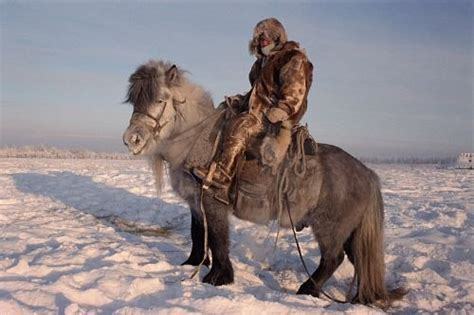
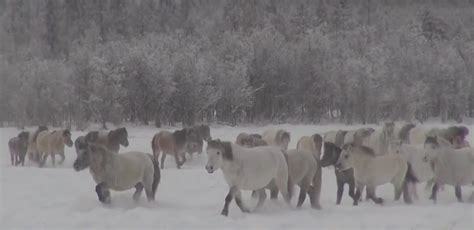
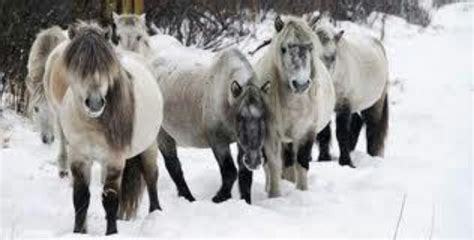
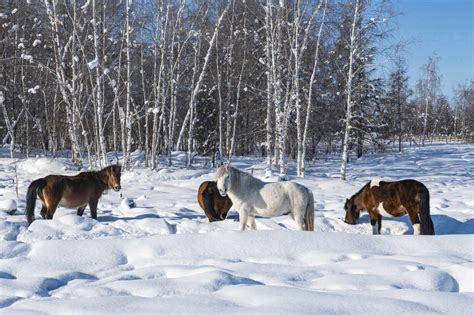
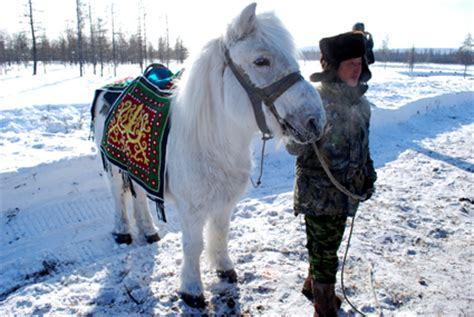
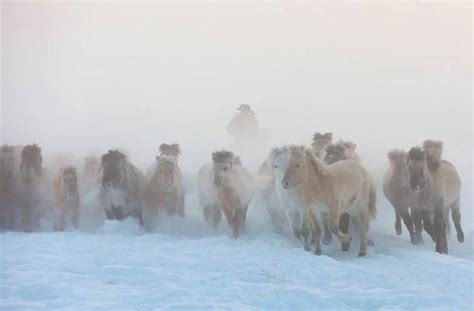
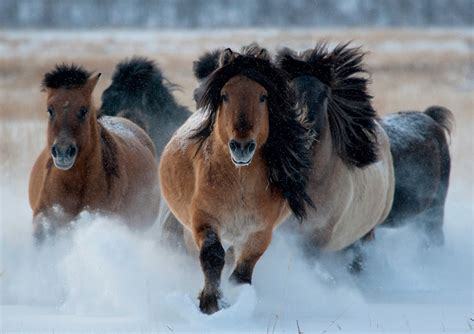
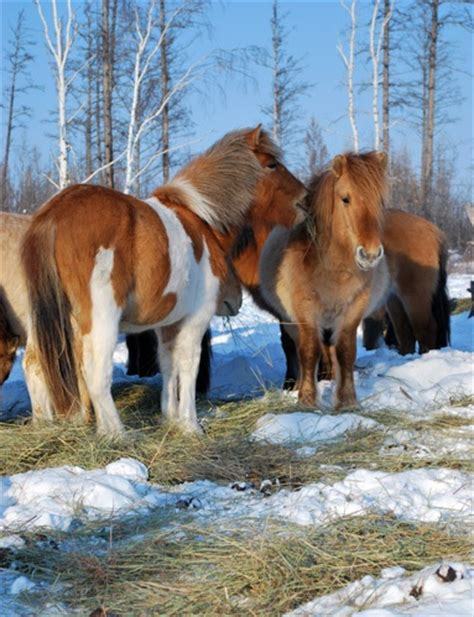
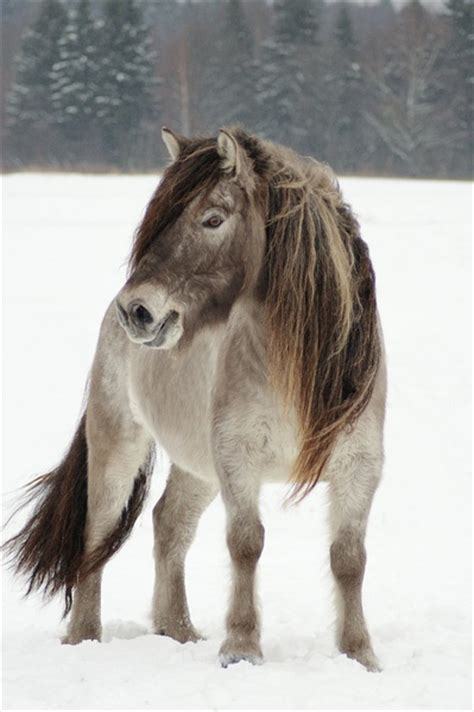
20 notes
·
View notes